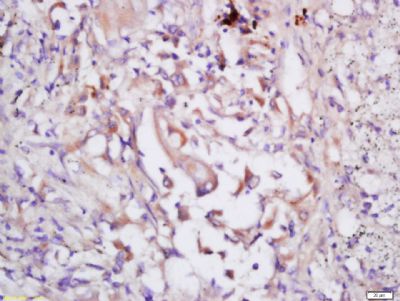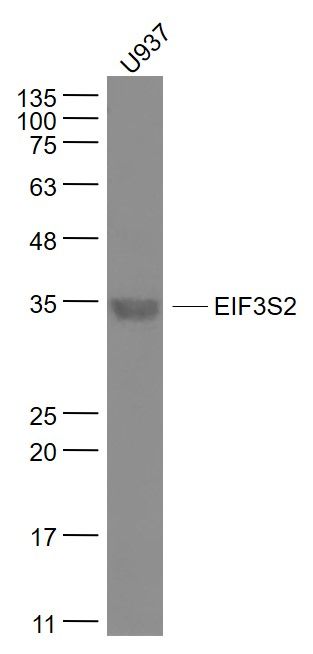EIF3S2 Polyclonal Antibody
Purified Rabbit Polyclonal Antibody (Pab)
- SPECIFICATION
- CITATIONS
- PROTOCOLS
- BACKGROUND

Application
| WB, IHC-P, IHC-F, IF, ICC, E |
|---|---|
| Primary Accession | Q13347 |
| Reactivity | Rat, Pig, Dog, Bovine |
| Host | Rabbit |
| Clonality | Polyclonal |
| Calculated MW | 37 KDa |
| Physical State | Liquid |
| Immunogen | KLH conjugated synthetic peptide derived from human EIF3S2 |
| Epitope Specificity | 161-260/325 |
| Isotype | IgG |
| Purity | affinity purified by Protein A |
| Buffer | 0.01M TBS (pH7.4) with 1% BSA, 0.02% Proclin300 and 50% Glycerol. |
| SUBCELLULAR LOCATION | Cytoplasm. |
| SIMILARITY | Belongs to the eIF-3 subunit I family. Contains 5 WD repeats. |
| Post-translational modifications | Phosphorylated by TGF-beta type II receptor. |
| Important Note | This product as supplied is intended for research use only, not for use in human, therapeutic or diagnostic applications. |
| Background Descriptions | The initiation of protein synthesis in eukaryotic cells is regulated by interactions between protein initiation factors and RNA molecules. Eukaryotic initiation factors (eIFs) are utilized in a sequence of reactions that lead to 80S ribosomal assembly and, ultimately, translation. The eukaryotic initiation factor-3 (eIF3) scaffolding structure is the largest of the eIF complexes and includes eIF3 alpha, eIF3 beta, eIF3 gamma, eIF3 delta, eIF3 epsilon, eIF3 omega, eIF3 eta, all of which function to control the assembly of the 40S ribosomal subunit. Association of eIF3 proteins with the 40S ribosomal subunit stabilizes eIF2-GTP-Met-tRNAiMet complex association and mRNA binding, and promotes dissociation of 80S ribosomes into 40S and 60S subunits, thereby promoting the assembly of the pre-initiation complex. Overexpression of eIF3 proteins is common in several cancers, suggesting a role for eIF3 proteins in tumorigenesis. |
| Gene ID | 8668 |
|---|---|
| Other Names | Eukaryotic translation initiation factor 3 subunit I {ECO:0000255|HAMAP-Rule:MF_03008}, eIF3i {ECO:0000255|HAMAP-Rule:MF_03008}, Eukaryotic translation initiation factor 3 subunit 2 {ECO:0000255|HAMAP-Rule:MF_03008}, TGF-beta receptor-interacting protein 1, TRIP-1, eIF-3-beta {ECO:0000255|HAMAP-Rule:MF_03008}, eIF3 p36 {ECO:0000255|HAMAP-Rule:MF_03008}, EIF3I {ECO:0000255|HAMAP-Rule:MF_03008} |
| Dilution | WB=1:500-2000,IHC-P=1:100-500,IHC-F=1:100-500,ICC=1:100-500,IF=1:100-500,ELISA=1:5000-10000 |
| Storage | Store at -20 ℃ for one year. Avoid repeated freeze/thaw cycles. When reconstituted in sterile pH 7.4 0.01M PBS or diluent of antibody the antibody is stable for at least two weeks at 2-4 ℃. |
| Name | EIF3I {ECO:0000255|HAMAP-Rule:MF_03008} |
|---|---|
| Function | Component of the eukaryotic translation initiation factor 3 (eIF-3) complex, which is required for several steps in the initiation of protein synthesis (PubMed:17581632, PubMed:25849773, PubMed:27462815). The eIF-3 complex associates with the 40S ribosome and facilitates the recruitment of eIF-1, eIF-1A, eIF-2:GTP:methionyl- tRNAi and eIF-5 to form the 43S pre-initiation complex (43S PIC). The eIF-3 complex stimulates mRNA recruitment to the 43S PIC and scanning of the mRNA for AUG recognition. The eIF-3 complex is also required for disassembly and recycling of post-termination ribosomal complexes and subsequently prevents premature joining of the 40S and 60S ribosomal subunits prior to initiation (PubMed:17581632). The eIF-3 complex specifically targets and initiates translation of a subset of mRNAs involved in cell proliferation, including cell cycling, differentiation and apoptosis, and uses different modes of RNA stem-loop binding to exert either translational activation or repression (PubMed:25849773). |
| Cellular Location | Cytoplasm {ECO:0000255|HAMAP-Rule:MF_03008}. |

Thousands of laboratories across the world have published research that depended on the performance of antibodies from Abcepta to advance their research. Check out links to articles that cite our products in major peer-reviewed journals, organized by research category.
info@abcepta.com, and receive a free "I Love Antibodies" mug.
Provided below are standard protocols that you may find useful for product applications.
If you have used an Abcepta product and would like to share how it has performed, please click on the "Submit Review" button and provide the requested information. Our staff will examine and post your review and contact you if needed.
If you have any additional inquiries please email technical services at tech@abcepta.com.













 Foundational characteristics of cancer include proliferation, angiogenesis, migration, evasion of apoptosis, and cellular immortality. Find key markers for these cellular processes and antibodies to detect them.
Foundational characteristics of cancer include proliferation, angiogenesis, migration, evasion of apoptosis, and cellular immortality. Find key markers for these cellular processes and antibodies to detect them. The SUMOplot™ Analysis Program predicts and scores sumoylation sites in your protein. SUMOylation is a post-translational modification involved in various cellular processes, such as nuclear-cytosolic transport, transcriptional regulation, apoptosis, protein stability, response to stress, and progression through the cell cycle.
The SUMOplot™ Analysis Program predicts and scores sumoylation sites in your protein. SUMOylation is a post-translational modification involved in various cellular processes, such as nuclear-cytosolic transport, transcriptional regulation, apoptosis, protein stability, response to stress, and progression through the cell cycle. The Autophagy Receptor Motif Plotter predicts and scores autophagy receptor binding sites in your protein. Identifying proteins connected to this pathway is critical to understanding the role of autophagy in physiological as well as pathological processes such as development, differentiation, neurodegenerative diseases, stress, infection, and cancer.
The Autophagy Receptor Motif Plotter predicts and scores autophagy receptor binding sites in your protein. Identifying proteins connected to this pathway is critical to understanding the role of autophagy in physiological as well as pathological processes such as development, differentiation, neurodegenerative diseases, stress, infection, and cancer.



